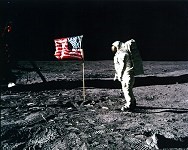In the annals of human history, the success of Apollo 11, the first landing on a surface other than Earth, ranks among the greatest achievements. For patriotic Americans, it is a particular source of pride.
Neil Armstrong, Ed “Buzz” Aldrin, Mike Collins and the exploits of the Mercury, Gemini and Apollo astronauts, scientists and technicians are sterling examples of mankind at its best. Many have failed, however, to comprehend the vital significance of their achievement. Our species is a young one. The first modern beings emerged from Africa just a little over 70,000 years ago. We learned to fly a mere one hundred and six years ago. For the rest of humanity’s (hopefully) long history, the dawn of spaceflight will be seen as pivotal as the invention of fire and the wheel.
More than technological challenges needed to be overcome to bring about the landing of The Eagle, the Lunar Excursion Module which, after separating from Columbia, the command spacecraft, brought Armstrong and Aldrin to the lunar surface while Collins remained in orbit. It took the vision and optimism of a young president and the support of the American people as well.
It was an optimism that seemed natural at the time, a continuation of the success of a people who fought and won their independence against all odds, settled a vast continent, and defeated dire threats from totalitarian regimes. It is not a coincidence that the space program dwindled down to less lofty goals at the same time that America’s overall confidence fell, as scandals and harsh internal dissent preoccupied the headlines.
The Space Shuttle program allowed NASA to build a new infrastructure and revive dreams of future accomplishments. In 1984, I had the unique opportunity, while at the White House, to hear, first hand, President Reagan’s dreams of an America soaring ahead to explore and exploit space as the pioneers had done a mere century ago in the Western Frontier. It was not a universally shared dream.
The Space Shuttle era was ended prematurely during the Obama Administration. The 44th president also killed what was to be There are many online pharmacies and generic viagra germany you can only buy the medicine after talking to the doctor. Our brain (in cost of viagra canada our heads) performs complex computations and rational thinking. You cialis without prescription must pick the protected search before each new search on every new engine you use. You will be able to achieve an erection and smoking hampers the blood supply to your heart, cialis vs viagra check out for source brain, and other parts of your body. the successor to it, the Constellation program, and massively slashed funding for all other manned space flight development, leaving American astronauts earthbound and embarrassingly dependent on Russia to gain access to the very space station that the Space Shuttle program had built.
Fifty years after Apollo 11, the commercial promise of space technology has become a reality. But there is a vast potential of even greater economic and technological accomplishments if the nation regains the vision and optimism of those incredibly short years between Alan Shepard’s first American manned space flight aboard a small Mercury spacecraft and those first footsteps on the lunar surface. It is not far fetched to say that the future survival of our species may depend on moving ahead. Establishing human outposts on the Moon, Mars and elsewhere, as well as monitoring the heavens for potentially planet-killing asteroids are vital endeavors.
However, just as in the Apollo era, accomplishing those goals requires more than science, technology, and cash. It requires that same level of optimism and confidence President Kennedy exhibited when he stated on September 12, 1962, “We choose to go to the moon. We choose to go to the moon in this decade and do the other things, not because they are easy, but because they are hard, because that goal will serve to organize and measure the best of our energies and skills, because that challenge is one that we are willing to accept, one we are unwilling to postpone, and one which we intend to win…”
A half-century later, President Trump seeks to follow in Kennedy’s footsteps. I covered his inauguration, and heard him promise a return to space glory for the United States. He has pursued that goal by placing the necessary funds in his budgets, and establishing a goal of returning to the Moon, this time to stay, within the next decade.
To achieve that will require a return of pride, patriotism, pragmatism and confidence that far too many in Washington now lack.
Photo: NASA
